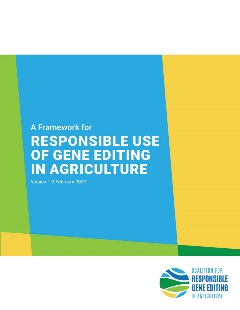By: David Fikes, Executive Director, FMI Foundation

My grandmother was fond of reminding her progeny that ‘the best time to prepare for a storm was NOT when it had already started raining.’ There are many variations on her theme, but the wisdom still holds that preparing in the calm is always preferable to trying to innovate, educate, and activate in the chaos.
Currently, the gene edited foods in the marketplace remains limited to a soybean-based oil lower in saturated fat. At this point consumer awareness, concern, and questions about this new food technology tool remains relatively low. It is not raining, yet, but the wind is shifting. Many food products that make use of CRISPR or TALENs gene-editing techniques are in varying stages of development and will soon hit the commercialization stage. Some of these pipelined gene edited food products, such as high fiber wheat, have definite health benefits. Others, such as high-yield tomatoes, non-browning potatoes and mushrooms, and drought tolerant wheat and corn offer great promise of delivering on the sustainability proposition. And the disease resistant tomatoes, grapes, rice, and soybeans that are in development will have production benefits crossing many boundaries including health, economics, food waste reduction, and more efficient use of farm fields.
While all these foods have the potential of providing great societal benefit, we also know that when these products hit the marketplace, consumers will have many questions about the biotech innovations that produced them. These inquiries will be complicated by the fact that most customers are not yet aware that gene editing is substantially different from gene modification (GMO), so they will likely paint gene edited food with a GMO brush. All this is to say, we are headed into another GMOish storm unless we handle things differently.
FMI has been part of a diverse coalition actively participating with the Center for Food Integrity in creating a non-regulatory framework called Responsible Use of Gene Editing. Years in the making, this piece has been endorsed by the FMI Board of Directors and several other companies including Costco, PepsiCo, Cargill, and Tropic Biosciences.
This framework may not be the magic bullet that will ward off all the gene-editing storm clouds, but it was created to help the food industry have solid responses to the customer inquiries when they begin escalating. This framework offers the hope of offering a different path in introducing gene edited food products in the marketplace.
On March 2, there will be an information sharing webinar regarding Responsible Use of Gene Editing. I – and if she were here, my grandmother would - strongly encourage you to participate in this opportunity to prepare in the calm and help forge a new path of consumer trust in gene-edited food products.


 Industry Topics address your specific area of expertise with resources, reports, events and more.
Industry Topics address your specific area of expertise with resources, reports, events and more.
 Our Research covers consumer behavior and retail operation benchmarks so you can make informed business decisions.
Our Research covers consumer behavior and retail operation benchmarks so you can make informed business decisions.
 Events and Education including online and in-person help you advance your food retail career.
Events and Education including online and in-person help you advance your food retail career.
 Food Safety training, resources and guidance that help you create a company food safety culture.
Food Safety training, resources and guidance that help you create a company food safety culture.
 Government Affairs work — federal and state — on the latest food industry policy, regulatory and legislative issues.
Government Affairs work — federal and state — on the latest food industry policy, regulatory and legislative issues.
 Get Involved. From industry awards to newsletters and committees, these resources help you take advantage of your membership.
Get Involved. From industry awards to newsletters and committees, these resources help you take advantage of your membership.
 Best practices, guidance documents, infographics, signage and more for the food industry on the COVID-19 pandemic.
Best practices, guidance documents, infographics, signage and more for the food industry on the COVID-19 pandemic.
